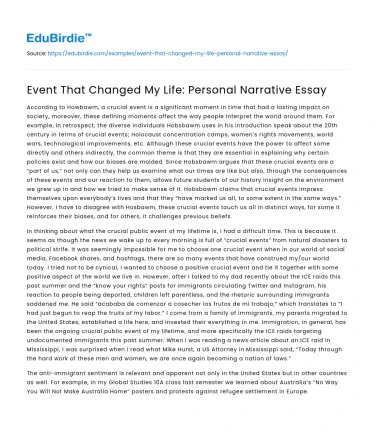According to Howbawm, a crucial event is a significant moment in time that had a lasting impact on society, moreover, these defining moments affect the way people interpret the world around them. For example, in retrospect, the diverse individuals Hobsbawm uses in his introduction speak about the 20th century in terms of crucial events; Holocaust concentration camps, women’s rights movements, world wars, technological improvements, etc. Although these crucial events have the power to affect some directly and others indirectly, the common theme is that they are essential in explaining why certain policies exist and how our biases are molded. Since Hobsbawm argues that these crucial events are a “part of us,” not only can they help us examine what our times are like but also, through the consequences of these events and our reaction to them, allows future students of our history insight on the environment we grew up in and how we tried to make sense of it. Hobsbawm claims that crucial events impress themselves upon everybody’s lives and that they “have marked us all, to some extent in the same ways.” However, I have to disagree with Hosbawm, these crucial events touch us all in distinct ways, for some it reinforces their biases, and for others, it challenges previous beliefs.
In thinking about what the crucial public event of my lifetime is, I had a difficult time. This is because it seems as though the news we wake up to every morning is full of “crucial events” from natural disasters to political strife. It was seemingly impossible for me to choose one crucial event when in our world of social media, Facebook shares, and hashtags, there are so many events that have construed my/our world today. I tried not to be cynical, I wanted to choose a positive crucial event and tie it together with some positive aspect of the world we live in. However, after I talked to my dad recently about the ICE raids this past summer and the “know your rights” posts for immigrants circulating Twitter and Instagram, his reaction to people being deported, children left parentless, and the rhetoric surrounding immigrants saddened me. He said “acababa de comenzar a cosecher los frutos de mi trabajo,” which translates to “I had just begun to reap the fruits of my labor.” I come from a family of immigrants, my parents migrated to the United States, established a life here, and invested their everything in me. Immigration, in general, has been the ongoing crucial public event of my lifetime, and more specifically the ICE raids targeting undocumented immigrants this past summer. When I was reading a news article about an ICE raid in Mississippi, I was surprised when I read what Mike Hurst, a US Attorney in Mississippi said, “Today through the hard work of these men and women, we are once again becoming a nation of laws.”
Save your time!
We can take care of your essay
- Proper editing and formatting
- Free revision, title page, and bibliography
- Flexible prices and money-back guarantee
The anti-immigrant sentiment is relevant and apparent not only in the United States but in other countries as well. For example, in my Global Studies 10A class last semester we learned about Australia’s “No Way You Will Not Make Australia Home” posters and protests against refugee settlement in Europe. The crucial ongoing event of immigration and the ICE raids has instilled in me and others a sense of fear. I resonate with children of undocumented immigrants who are confused, angered, and disgusted with the negative discourse surrounding immigrants. Those who speak down upon our family, belittle their hard work and perseverance, and make us feel helpless, on edge, and afraid. I feel that these deportations are a divisive issue, and certainly, as of now, it feels as though the nationalist treatment countries show immigrants could be a defining moment of this decade. The ICE raids specifically, but immigration in general, have shaped the way I view the world as “them” and “us.” I try to understand those who shamelessly regurgitate hateful slogans like “Build the Wall,” but there seems to be a lack of empathy in their opinion that I can’t wrap my head around. Therefore, my pro-immigration inclination/bias has shaped the way I view the world’s conflicts, some would say in a rather naive way, but certain topics seem to me like there shouldn’t be an argument. It is obvious that not all immigrants are criminals, that they help economies flourish, and that we must help asylum seekers and refugees.






 Stuck on your essay?
Stuck on your essay?

